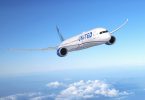Reports have reached from acquaintances in Nigeria about the latest developments over Sir Richard Branson’s Nigerian aviation (mis)adventure. Virgin Nigeria, which started operations a few years ago and was then greeted almost like a savior and given the “red carpet” treatment from the political leadership in Nigeria.
Much has changed since then. For one, the airline has been under immense pressure to move its domestic operation to a new terminal. The problem with this move, however is, that passenger links from the international arrivals terminal are virtually absent and take reportedly some 15 or more minutes driving in the best of circumstances.
More sinister, however, was the finding that one of the terminal’s owners appears to be the legal advisor to Nigerian President Umaru Yar’Adua, immediately entering a political dimension to the case and suggesting top level influence peddling and potentially another case of prominent corrupt practices.
Probably to “strengthen” their case for Branson’s Virgin Nigeria to reconsider their move to the new terminal, a gang of thugs then trashed the Virgin lounge, with airport security and other security organs conspicuously absent until the posh business class lounge was laid to ruin and the criminals had escaped into thin air again.
Virgin Nigeria claims to have a valid annex to their Memorandum of Mutual Understanding, (MOMU) under which the airline was formed some years ago and in which Branson’s Virgin Atlantic holds 49 percent shares, to comply with Nigerian aviation laws on ownership, under which they were granted both international and domestic operations from the same terminal.
The Nigerian government subsequently hastened to form a governmental committee comprising the transport and justice ministers, amongs others, and claimed that the annex to the MOMU was “not valid” and “only stamped” by the aviation authorities but not mutually signed and therefore not invalid and insists that Virgin Nigeria has to move its domestic operations to the new terminal.
Branson has in recent weeks already made it clear that he would wish to sell his stake in the Nigerian airline offspring, probably then also withdrawing his brand from the carrier. The latest violent attack on the lounge has undoubtedly worsened the situation and will do little to persuade the British mogul to stay on.
Nigeria has long been perceived as one of the most corrupt countries not only in Africa but globally as well. While much detail has emerged since the end of the military dictatorships over the massive personal enrichment of the former military rulers, little, if anything, seems to have changed since the country returned to civilian rule.
There is, however, a silver lining in this whole story. Virgin is also flying to East Africa, namely Nairobi, on a daily basis from London and should the Nigerian (ad)venture collapse Branson has the option to shift his attention to Eastern Africa. Since starting operations to Kenya last year, the airline has stuck to the destination in spite of the political wobbles earlier in the year and subsequent drop in passenger number, which has since stabilized and the route is again on course to become a profitable destination.
Sir Richard Branson has visited Kenya repeatedly in the past and has engaged in conservation support on a significant scale. It is, therefore, not entirely out of question that Virgin Atlantic may at some stage in the future consider forming a “Virgin East Africa” once the aviation industry has stabilized again from the current global turmoil. Nigeria’s loss would without doubt be a potential gain for East Africa.






















